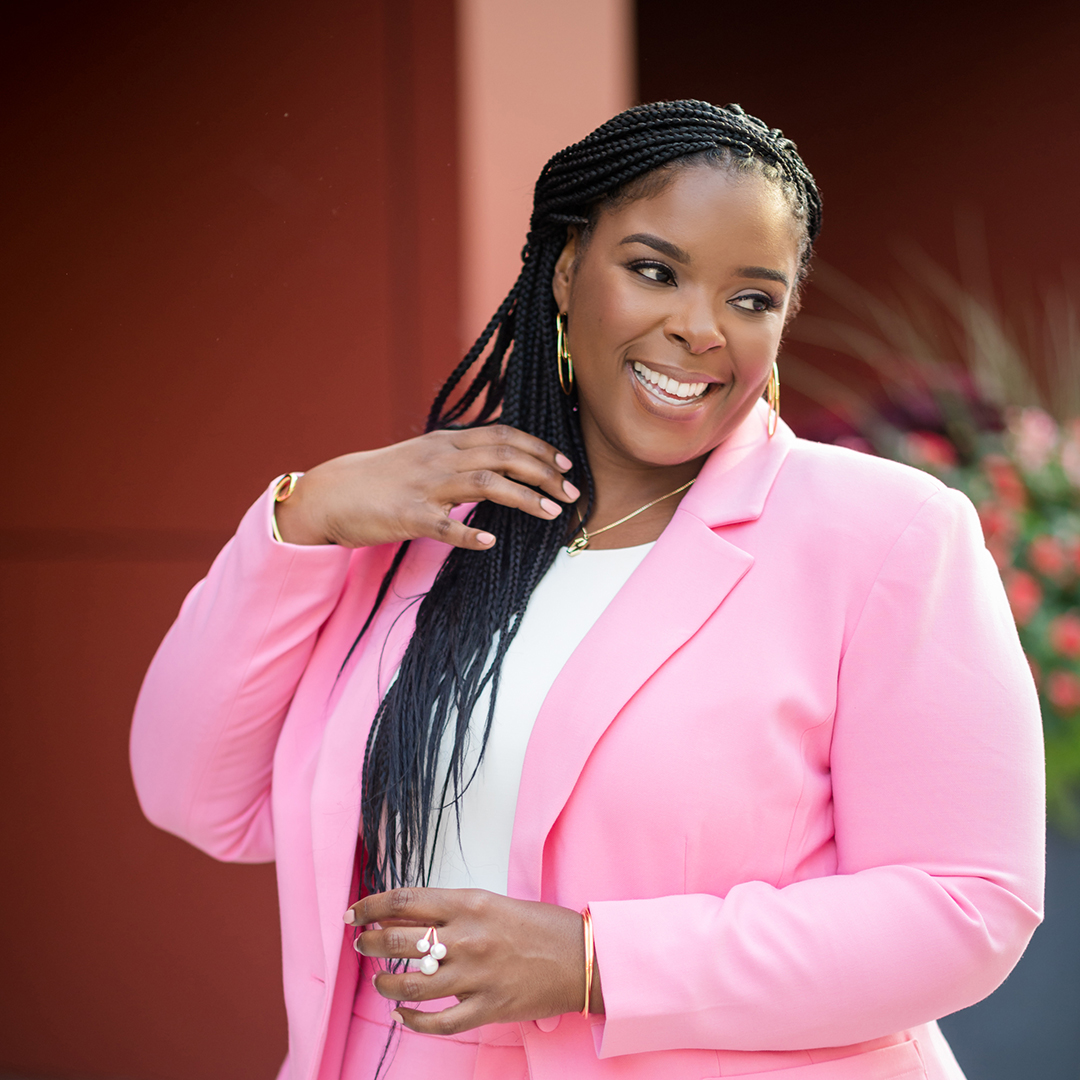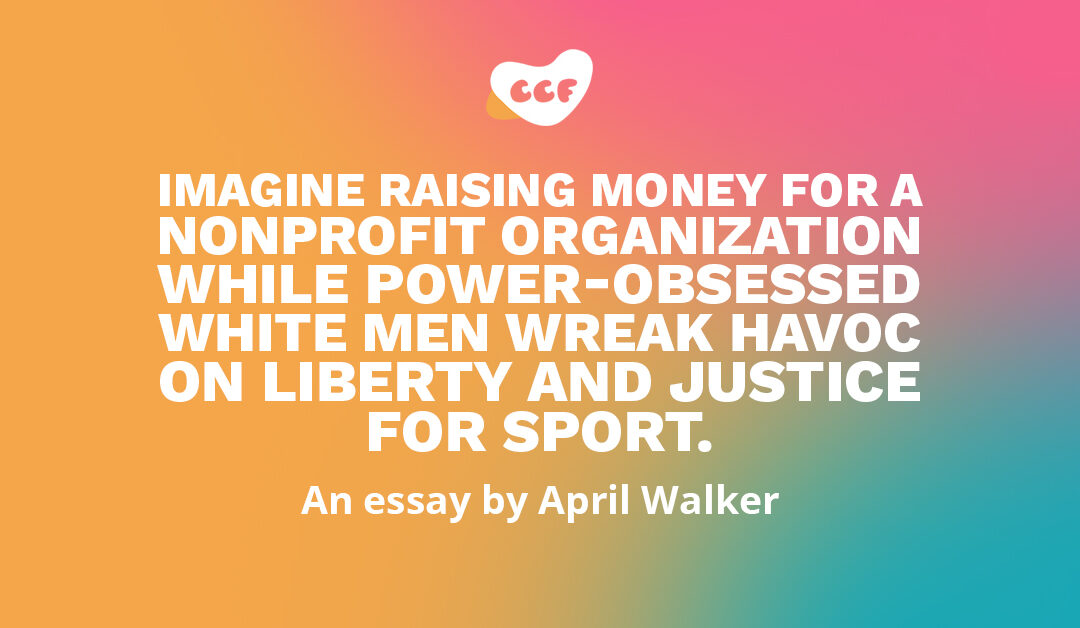By April Walker, a writer, speaker, consultant, and strategist who unapologetically champions racial equity and social justice through her work in philanthropy and nonprofit leadership.
…amidst new waves of political chaos and cruelty, I’m back again—this time with an invitation to build community in a new way, namely to make peers and colleagues of our ancestors.
Imagine raising money for a nonprofit organization while power-obsessed white men wreak havoc on liberty and justice for sport.
Oh, pardon me. That was simply last Tuesday, or maybe it was this Thursday. It is much too easy to lose track.
I will forever contend that it is an unnatural thing to proofread a grant proposal while bombs are dropped on Gaza, or to rewrite an annual appeal while famine rolls across Sudan and cease-fire talks crumble before they start.
Still, these aren’t the only times throughout my career that I have been tucked behind a desk, staring at unopened emails, trying to make sense of labor and loss.
July 6, 2016, comes to mind: the day videos circulated on social media of police officers ensuring Philando Castile and Alton Sterling took their last breaths.
The same was true several days during the COVID-19 pandemic, when we could quote the number of lives lost and small businesses shuddered overnight. That December, I found it too big an ask to conduct business as usual, to fundraise while the need for collective grieving went unrealized around me.
My contemplation led to an end-of-year message for this community on surviving year-end fundraising—a message of support for trusting your instincts and prioritizing self-care.
Nearly five years later, amidst new waves of political chaos and cruelty, I’m back again—this time with an invitation to build community in a new way, namely to make peers and colleagues of our ancestors.
I use the word ‘ancestors’ lovingly and broadly, painting with a wide brushstroke to include those beyond my direct lineage for a few reasons. As is true for many Black Americans, I can trace my roots to the period just before the Great Migration, but not far beyond. Slavery’s legacy of family separation often makes specificity impossible. Thus, I root myself firmly in the Black American diaspora, among the descendants of enslaved Africans whose survival through forced labor made this nation’s wealth and philanthropy possible to begin with.
I also speak of ancestors en masse because there is much to learn from the artists, activists, poets, and teachers who came before us—those who faced turmoil and totalitarianism but maintained threads of hope; those who did not need to define mutual aid or formalize a giving circle to live generous and charitable lives.
As fundraisers, we have a professional proximity to wealth that can accelerate a lot of good. I encourage us to look back more often and to look deeply. Wherever there has been lack, there have been people willing to fill in the gap. What might they want us to know? What mistakes can we avoid repeating? What language and solutions lie dormant in a letter, memoir, essay, or even sculpture, waiting for a present-day set of eyes?
Choose Your Guides
I place myself at the feet of Zora Neale Hurston and her contemporaries. We are seated around a mahogany oak dining table in Harlem. Ours is a flowing conversation that spans generations and genres. Fast-forward two decades, and I just as easily imagine myself nearby as Nikki Giovanni debates James Baldwin, or maybe I’m in a reading room passing a teapot between Audre Lorde and bell hooks.
These may not be the first names that come to mind when you think of fundraising or philanthropy. Yet, there is much to learn from them about the condition of the human spirit, ourselves, and fortitude, especially as we navigate newsreels of nuclear weapons and wasteful displays of military might.
My encouragement is to not settle for the biographies, art, and narratives that have made their way into the mainstream. Take a deep dive into someone’s story, learn about the scholarship they received or the humble estate they left behind. Bring the wisdom of the past with you when thriving in the present moment or hoping for brighter futures feels too heavy a lift.
Your Inheritance, Your Repair
There is other ancestral work to be done, too, especially if your inheritance of privilege comes from generations of violence and extraction. Even more, if those before you skirted by on silence and inaction, sailing on waves of ambiguity not afforded others.
It is simply true that many ancestors taught us who not to be. I hope that we are well-versed enough to ensure that we are unlike them in both behavior and spirit. It is possible and necessary to hold gratitude for their existence alongside self-determination to not replicate bias, hatred, othering, and the violence therein.
These days, the opportunities to position ourselves on the side of history where humanity, justice, and equity reside are ever-present. The rich are richer than ever, and the barriers to living lives rooted in dignity mount with every new and unnecessary executive order.
Don’t leave the demands for reparations to those who are owed. Especially when you find allyship at an impasse, ask yourself: Whose debt will you repay? What public record will you correct? What message needs to be conveyed at your next annual gala? How can you push your donor community to withstand a little discomfort in search of greater truths?
Imperfections Make the Story
As we seek ancestral wisdom, we must be careful not to romanticize the legacies of those who came before us. The best example of this occurs every Black History Month, when we are presented with a watered-down version of Dr. Martin Luther King Jr.’s life as if his 39 years on this earth needed to be blemish-free to be impactful.
The late Professor Charles Willie, a classmate of Dr. King’s, reminds us that “It is an ancient custom….to idolize those whom we honor, to make them larger than life,” and that by doing so, we limit our imagination of what is possible and who we supposedly need to be to achieve great things.
Let’s consider the future generations of nonprofit professionals and social impact sector leaders who may derive strength knowing we showed up on January 7, 2021, to face another day or hope from learning how we pushed through the pandemic. It is okay, and indeed helpful, if they know about the times we failed and succeeded in the same breath.
I cannot tell you exactly where to begin your search for ancestral community, but I can say with confidence that the exploration will be worthwhile. The nonprofit missions we work to realize will be shaped with greater color and depth when you invite a larger narrative and begin to understand people, neighborhoods, and communities beyond their present condition.
There is some peace, too, in staying reminded that the political theater of the moment is being pulled from an old handbook. I venture that our ancestors left behind a few footpaths overgrown with weeds, and I hope you will join me in their recovery.

April Walker
April Walker (she/her) is a nonprofit and foundation consultant, equity and social justice champion, keynote speaker, and writer whose career in philanthropy spans grantmaking, fundraising, and consulting roles. As Founder and CEO of Philanthropy for the People™, April leads and facilitates equity-centered projects and initiatives designed to equip donors, foundations, and nonprofits to embrace fundraising and grantmaking strategies that center racial equity and social justice. A proud Baltimore native, April called the Midwest home for more than a decade before adopting a geoflexible work and lifestyle.
April earned a Master of Arts in Social Service Administration from the University of Chicago, a BA in Sociology from The George Washington University, and a certificate in Diversity and Inclusion from Cornell University.
To get in touch, subscribe to April’s Substack, send tips via Venmo, or connect via her website and LinkedIn.
Discover more from CCF
Subscribe to get the latest posts sent to your email.

